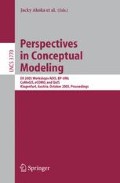Abstract
Semantic quality expresses the degree of correspondence between the information conveyed by a model and the domain that is modelled. As an early quality indicator of the system that implements the model, semantic quality must be evaluated before proceeding to implementation. Current evaluation approaches are based on ontological or meta-model analysis and/or use objective metrics. They ignore the model user’s perception of semantic quality, which also determines whether the benefits of using a faithful model will be achieved. The paper presents the development of a perceived semantic quality measure. It presents a measure pre-test, i.e. a study aimed at refining and validating a new measure before its use in research and practice. The results of the pre-test show that our measure is reliable and that it is sufficiently differentiated from other perception-based measures of information model use like ease of use, usefulness, and user information satisfaction.
Access this chapter
Tax calculation will be finalised at checkout
Purchases are for personal use only
Preview
Unable to display preview. Download preview PDF.
References
Akoka, J., Comyn-Wattiau, I.: Les systèmes d’information comptables multidimensionnels: Comparaison de deux modèles. Working Paper (2004)
Campbell, D.T., Fiske, D.W, Convergent and Discriminant Validation by the Multitrait-MultiMethod Matrix. Psychological Bulletin, 81–105 (1959)
Churchill, G.A.: A Paradigm for Developing Better Measures of Marketing Constructs. J. Marketing Research 16, 64–73 (1979)
Clark, L.A., Watson, D.: Constructing Validity: Basic Issues in Objective Scale Development. Psychological Assessment 7(3), 309–319 (1995)
Davis, F.: Perceived Usefulness, Perceived Ease of Use, and User Acceptance of Information Technology. MIS Quarterly 13(3), 319–339 (1989)
Dunn, C.L., Grabski, S.V.: Perceived semantic expressiveness of accounting systems and task accuracy effects. Int’l J. Accounting Information Systems 1(2), 79–87 (2000)
Etien, A., Rolland, C.: A Process for Generating Fitness Measures. Presented at the 17th Conf. Advanced Information Systems Engineering (2005)
Froehle, C.M., Roth, A.V.: New measurement scales for evaluating perceptions of the technology-mediated customer service experience. J. Operations Management 22(1), 1–21 (2004)
Gemino, A., Wand, Y.: Evaluating modeling techniques based on models of learning. Communications of the ACM 46(10), 79–84 (2003)
Gemino, A., Wand, Y.: Complexity and Clarity in Conceptual Modeling: Comparison of Mandatory and Optional Properties. Data & Knowledge Engineering (2005)
Lindland, O.I., Sindre, G., Sølvberg, A.: Understanding Quality in Conceptual Modeling. IEEE Software 11(2), 42–49 (1994)
Loevinger, J.: Objective tests as instruments of psychological theory. Psychological Reports 3, 635–694 (1957)
Moody, D.L.: Dealing with Complexity: A Practical Method for Representing Large Entity Relationship Models. PhD Dissertation. University of Melbourne (2001)
Nunally, J.: Psychometric Theory. McGraw-Hill, New York (1978)
Parsons, J., Cole, L.: What Do the Pictures Mean? Guidelines for Experimental Evaluation of Representation Fidelity in Diagrammatic Conceptual Modeling Techniques. Data & Knowledge Engineering (2005)
Patig, S.: Zur Ausdrucksstärke der Stammdaten des Advanced Planning and Scheduling. Wirtschaftsinformatik 46(2), 97–106 (2004)
Poels, G., Maes, A., Gailly, F., Paemeleire, R.: A Measure for the Perceived Semantic Expressiveness of Accounting Information Models. Presented at the 5th Int’l Research Symposium on Accounting Information Systems (2004)
Poels, G., Maes, A., Gailly, F., Paemeleire, R.: User Attitudes towards Pattern-Based Enterprise Information Models: A Replicated Experiment with REA Diagrams. Presented at the 2nd Int’l Conf. on Enterprise Systems and Accounting. (2005)
Seddon, P., Yip, S.-K.: An Empirical Evaluation of User Information Satisfaction (UIS) Measures for Use with General Ledger Accounting Software. J. Information Systems 6(1), 75–92 (1992)
Shanks, G., Tansley, E., Weber, R.: Using ontology to validate conceptual models. Communications of the ACM 46(10), 85–89 (2003)
Wand, Y., Weber, R.: Information Systems and Conceptual Modeling – A Research Agenda. Information Systems Research 13(4), 363–376 (2002)
Author information
Authors and Affiliations
Editor information
Editors and Affiliations
Rights and permissions
Copyright information
© 2005 Springer-Verlag Berlin Heidelberg
About this paper
Cite this paper
Poels, G., Maes, A., Gailly, F., Paemeleire, R. (2005). Measuring the Perceived Semantic Quality of Information Models. In: Akoka, J., et al. Perspectives in Conceptual Modeling. ER 2005. Lecture Notes in Computer Science, vol 3770. Springer, Berlin, Heidelberg. https://doi.org/10.1007/11568346_41
Download citation
DOI: https://doi.org/10.1007/11568346_41
Publisher Name: Springer, Berlin, Heidelberg
Print ISBN: 978-3-540-29395-8
Online ISBN: 978-3-540-32239-9
eBook Packages: Computer ScienceComputer Science (R0)

